Unit 3 Where did you go 单元复习(三)-语法+典型例题(共66张PPT)
文档属性
| 名称 | Unit 3 Where did you go 单元复习(三)-语法+典型例题(共66张PPT) |

|
|
| 格式 | pptx | ||
| 文件大小 | 64.0MB | ||
| 资源类型 | 试卷 | ||
| 版本资源 | 人教版(PEP) | ||
| 科目 | 英语 | ||
| 更新时间 | 2025-03-11 00:00:00 | ||
图片预览


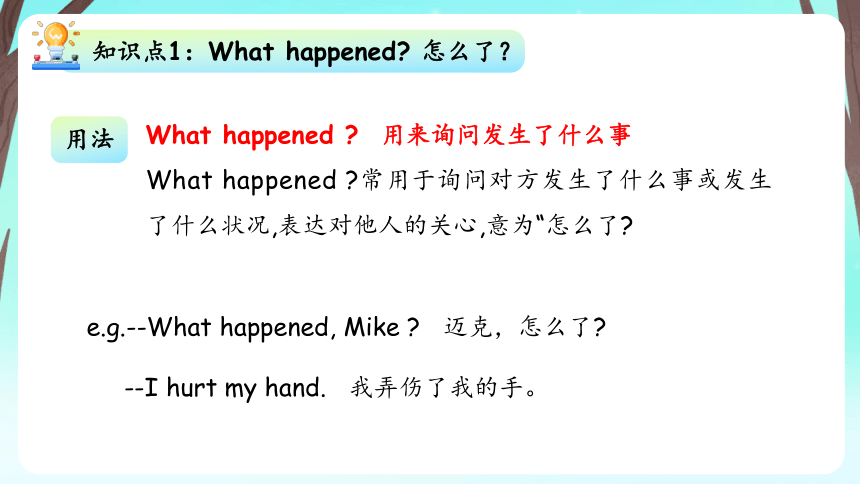
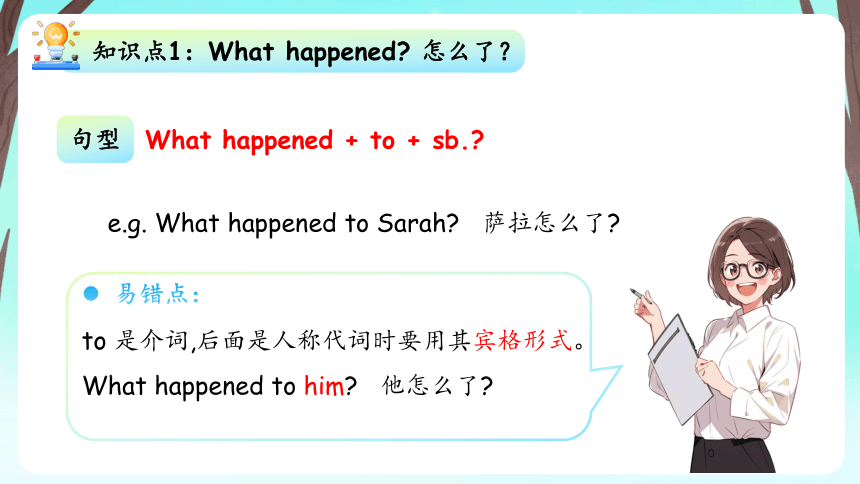
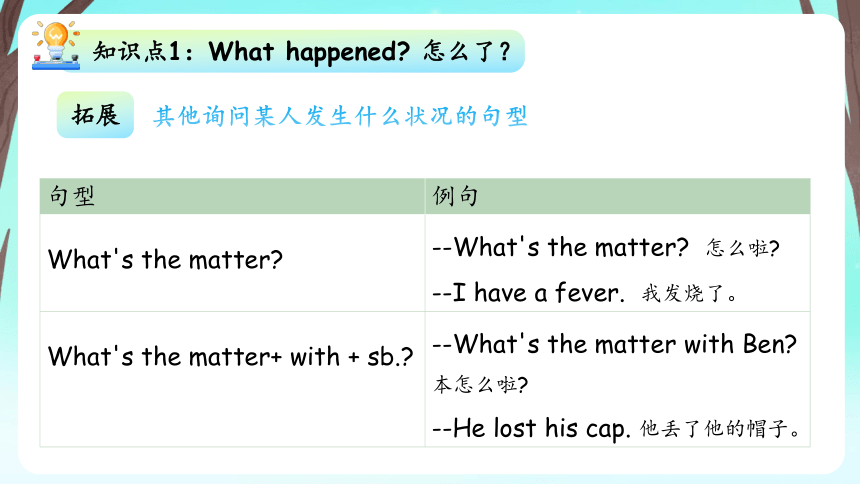
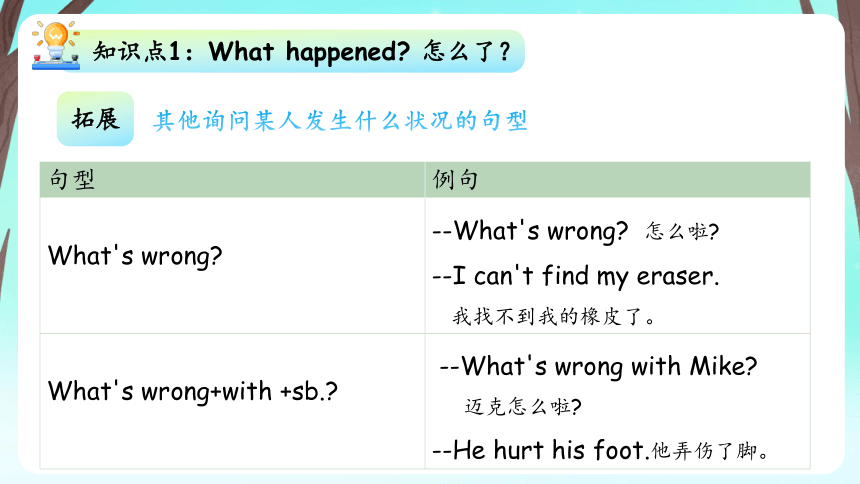
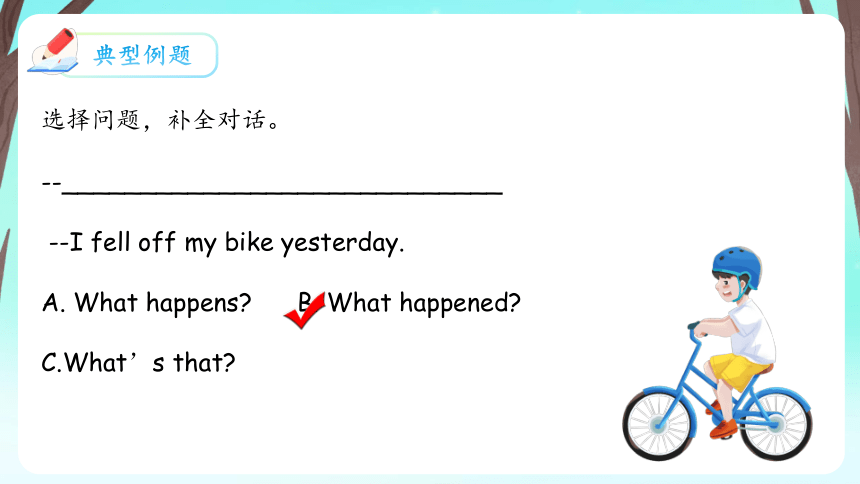
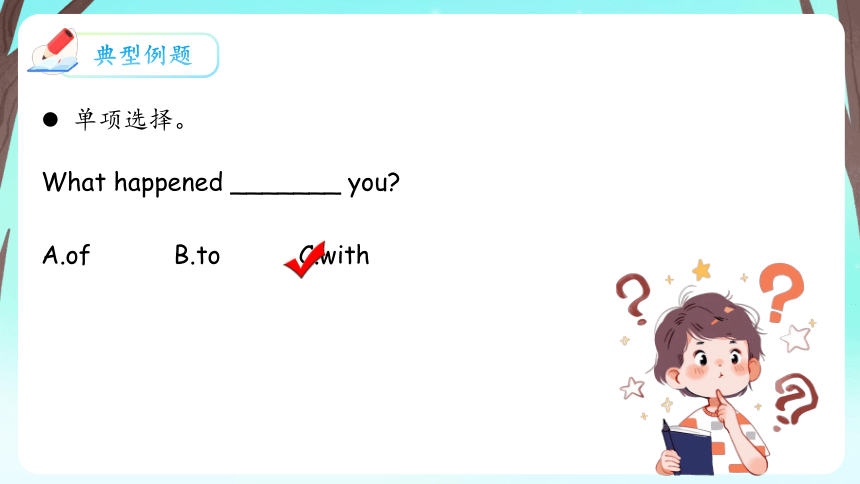
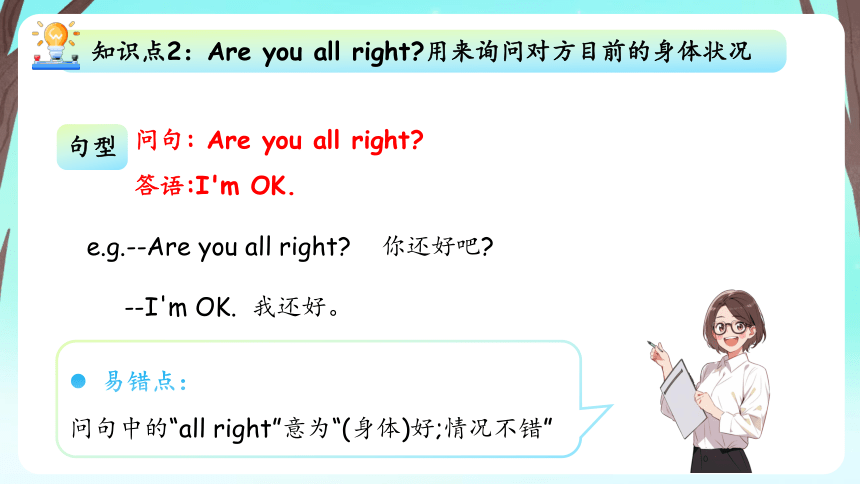
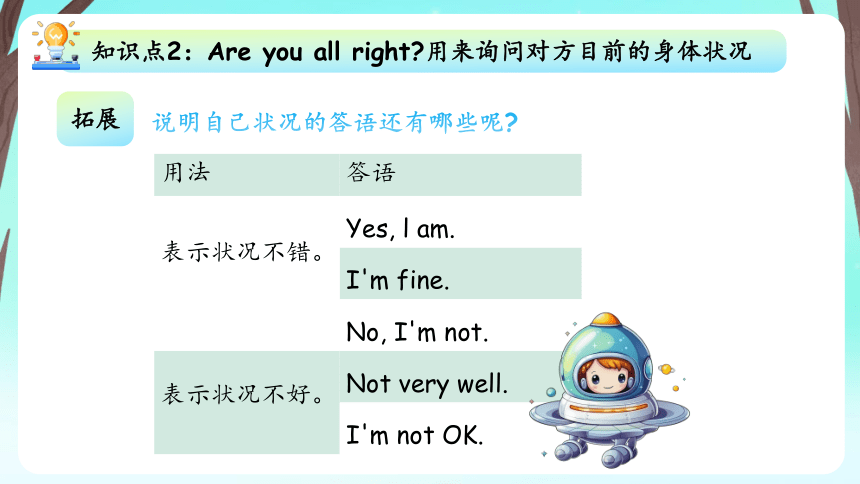
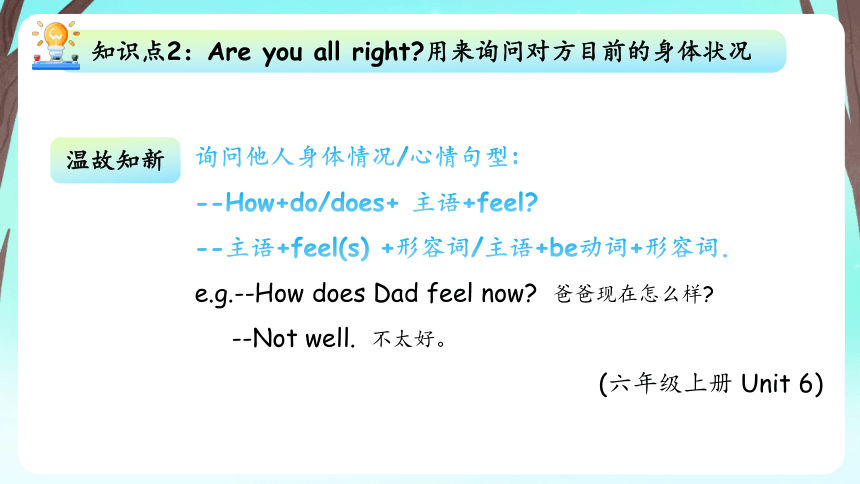
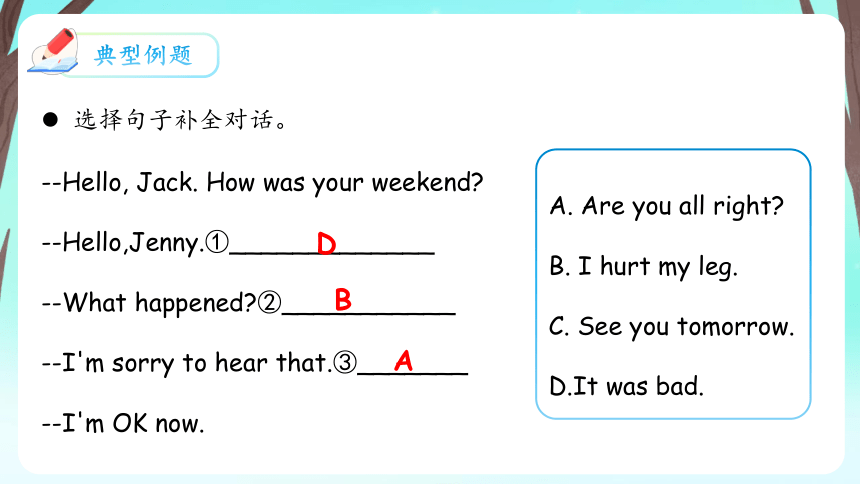
文档简介
(共66张PPT)
—人教六下复习课件—
主讲教师:Cici
时间:2024.04.14
知识点1:What happened 怎么了?
What happened 用来询问发生了什么事
What happened 常用于询问对方发生了什么事或发生了什么状况,表达对他人的关心,意为“怎么了
用法
e.g.--What happened, Mike 迈克,怎么了
--I hurt my hand. 我弄伤了我的手。
知识点1:What happened 怎么了?
What happened + to + sb.
句型
e.g. What happened to Sarah 萨拉怎么了
易错点:
to 是介词,后面是人称代词时要用其宾格形式。
What happened to him 他怎么了
知识点1:What happened 怎么了?
其他询问某人发生什么状况的句型
拓展
句型 例句
What's the matter --What's the matter 怎么啦
--I have a fever. 我发烧了。
What's the matter+ with + sb. --What's the matter with Ben
本怎么啦
--He lost his cap. 他丢了他的帽子。
知识点1:What happened 怎么了?
其他询问某人发生什么状况的句型
拓展
句型 例句
What's wrong --What's wrong 怎么啦
--I can't find my eraser.
我找不到我的橡皮了。
What's wrong+with +sb. --What's wrong with Mike
迈克怎么啦
--He hurt his foot.他弄伤了脚。
典型例题
选择问题,补全对话。
--____________________________
--I fell off my bike yesterday.
A. What happens B. What happened
C.What’s that
典型例题
单项选择。
What happened _______ you
A.of B.to C.with
知识点2:Are you all right 用来询问对方目前的身体状况
问句: Are you all right
答语:I'm OK.
句型
e.g.--Are you all right 你还好吧
--I'm OK. 我还好。
易错点:
问句中的“all right”意为“(身体)好;情况不错”
知识点2:Are you all right 用来询问对方目前的身体状况
说明自己状况的答语还有哪些呢
拓展
用法 答语
表示状况不错。 Yes, l am.
I'm fine.
No, I'm not.
表示状况不好。 Not very well.
I'm not OK.
知识点2:Are you all right 用来询问对方目前的身体状况
询问他人身体情况/心情句型:
--How+do/does+ 主语+feel
--主语+feel(s) +形容词/主语+be动词+形容词.
e.g.--How does Dad feel now 爸爸现在怎么样
--Not well. 不太好。
(六年级上册 Unit 6)
温故知新
典型例题
选择句子补全对话。
--Hello, Jack. How was your weekend
--Hello,Jenny.①_____________
--What happened ②___________
--I'm sorry to hear that.③_______
--I'm OK now.
A. Are you all right B. I hurt my leg.
C. See you tomorrow. D.It was bad.
D
B
A
典型例题
选择句子补全对话。
--Can you go to school tomorrow
--Yes,I can.
--OK.④_______
A. Are you all right B. I hurt my leg.
C. See you tomorrow. D.It was bad.
C
知识点3:Where did sb. go 用来询问某人过去去了哪里
问句: Where + did +主语+go (+过去时间)
答语:(主语+ went to +)地点.
句型
e.g.--Where did you go yesterday 昨天你去哪里了
--I went to the park. 我去公园了。
知识点3:Where did sb. go 用来询问某人过去去了哪里
易错点:
1.问句中含有实义动词go,是一般过去时态,要用助动词 did 帮助构成疑问句,实义动词go要用原形。
2.答句中表示地点的词如果是here, there 等副词, went 之后的 to 要省略。
典型例题
选一选。
Where ______ you go the day before yesterday
A. do B.are C.did
知识点4:look like 表示“看起来像……”
look like 表示“看起来像……”
词组
主语+look(s) like +名词或人称代词宾格
句型
e.g.She looks like her mother.
她看上去像她妈妈。
知识点4:look like 表示“看起来像……”
温故知新:like的其他用法
① be like 常用于询问某人的外貌或性格
-What's she like 她什么样
-She's kind.她很和蔼。
(五年级上册 Unit 1)
知识点4:look like 表示“看起来像……”
② would like“想要”,
e.g. I'd like some juice please. 请给我些果汁。
(三年级上册 Unit 5)
③ like sth. / doing sth. / to do sth....“喜欢(做)….”
e.g. He likes reading stories.他喜欢读故事。
(六年级上册Unit 4)
典型例题
选一选。
His father________ his grandfather.
A. look like B. looks like
C. look likes
典型例题
根据答语选择正确的问句。
①--____________________
--He’s tall and thin.
②--____________________
--No, I look like my father.
A. What's he like
B. Would you like some rice
C. Does he like singing
D. Do you look like your
mother
A
D
典型例题
根据答语选择正确的问句。
③--____________________
--No, thanks.
④--____________________
--No, he doesn't.
A. What's he like
B. Would you like some rice
C. Does he like singing
D. Do you look like your
mother
B
C
知识点5:Did sb. go (to) ... 用来询问某人是否去过某地
问句: Did +主语+ go ( + to)+地点(+过去时间)
答语:Yes,主语+ did./No,主语+ didn't.
句型
e.g.--Did Mike go to Harbin 迈克去哈尔滨了吗
--No, he didn't. 不,他没去。
易错点:
句中表示地点的词语如果是副词here,there 等, go 之后的 to 要省略。
知识点6:not ... till ...的用法
not ... till ..意为“直到……才……”,常用于口语中,相当于“not ... until ...”
用法
e.g.They won't be ready till August. 它们直到八月才成熟。
He didn't get up till seven this morning.
他今天早晨七点才起床。
He didn't go to bed till his mother came back.
直到他妈妈回来他才上床睡觉。
典型例题
选一选
They didn't come to school ________ nine o'clock.
A.on B./ C.till
知识点7:一词多义的 over
含义 用法
prep.在……期间 I took a trip over the holiday. 我在假期里旅游了。
prep.在……之上, 在……正上方 A lamp was hanging over the table.
在桌子上悬挂着一盏灯
prep.多于;超过 She's over thirty. 她三十多岁。
adv.结束 School is over. 放学了。
prep.穿过;越过 They ran over the grass. 他们跑过草地。
典型例题
选一选
I took lots of pictures ________ the winter holiday.
A. to B.at C. over
典型例题
写出 over 在下列句子中的恰当含义。
① There is a bridge over the river. __________
② He has lived here over two years.________
③ The test is over.________
④He jumped over the wall. ___________
prep.在……之上
超过
结束
prep.在……之上
知识点8:How did sb. go ...
How did sb. go ... 用来询问某人过去时间去某地的交通方式
用法
问句: How + did +主语+ go (+to)+地点(+其他)
答语:主语+ went (to) +地点+交通方式.
句型
e.g.How did you go there 你们怎么去的
-We went there by plane. 我们坐飞机去的。
知识点8:How did sb. go ...
温故知新:一般现在时问答某人出行方式
句型:--How do / does +主语+动词原形+其他
--主语+动词原形/动词的第三人称单数形式+交通方式
e.g.--How does he go to work 他怎么去上班
--He goes to work by bike.他骑自行车去上班。
(六年级上册Unit 5)
典型例题
单项选择。
① --_______ did Mike go to Hainan
--He went there by train.
A. What B.When C.How
② How ___ you go to Qinghai last weekend
A. do B. did C.were
知识点9:交通方式的表达
by
by plane
乘坐飞机
by taxi
乘出租车
by bus
乘公交车
by subway
乘地铁
by ship
乘船
by train
乘坐火车
on foot
步行
知识点9:take用法知多少
take的用法
拿走
Please take the book to Lucy.
乘坐
Take the No.57 bus over there.
购买
I’ll take it.
上课
take a dancing class
拍照
take pictures
take的用法
吃(药)
You should take some medicine.
摘下
take off your hat
呼吸
take a deep breath
旅行
take a trip
知识点9:take用法知多少
典型例题
给下列图片选择相应的句子。
( ) ( ) ( ) ( )
A. I took lots of pictures yesterday.
B. She took a maths class last Sunday.
C. We took the No. 34 bus yesterday. D. They are going to take a trip.
A
C
D
B
”也”有说法
also
用于句中,肯定句
too
用于句末,肯定句或疑问句
either
用于句末,否定句
知识点11:”也”有说法
e.g. He also came. 他也来了
e.g. I like you, too.我也喜欢你。
e.g. I don't know, either.我也不知道。
典型例题
选词填空
1.He wanted to go.
2.He wanted to go, .
4.She is yong,beautiful,and rich.
5.He doesn’t like watermelons.Me .
6.--I’m tired.
--Me .
too
also
either
also
too
also
too
too
知识点12:Sounds great! 听起来很不错!
Sounds great! 意为“听上去不错!”。是对某事或某个建议作出评价时常用的语言。此句省略了主语,完整的句子是 “It / That sounds great! ”。
考向1
sound 还可以作名词,意为“声音”
考向2
sound
v.听上去;听起来常与形容词连用
The way sounds good.
这个办法听起来不错。
His singing sounds noisy.
他的歌声听起来很吵。
n.声音
Strange sounds came from the next room.
奇怪的声音来自隔壁房间。
看起来
look
摸起来
尝起来
听起来
闻起来
taste
smell
sound
feel
常见的感官系动词
知识点12:Sounds great! 听起来很不错!
常见的感官系动词
拓展
感官系动词 词义 例句
look 看起来 You look well. 你看起来气色很好。
feel 摸起来 Your hand feels cold. 你的手摸起来很凉。
taste 尝起来 The cake tastes good. 蛋糕尝起来不错。
smell 闻起来 These flowers smell very sweet.
这些花闻起来很香。
典型例题
单项选择。
1.--I want to visit the Great Wall.
--_________great.
A. Sounds B.Sound C.That
典型例题
单项选择。
2.I ______ sick.
A. feel B. taste C. feels
3. The bread ______ good.
A. sounds B.taste C.tastes
典型例题
多项选择。
你想赞同他人的建议,你可以这样说________:
A. That sounds great!
B. Sounds good.
C. Sounds nice.
知识点13:sometime与sometimes的不同
sometime
在某时
表示在一个不确定的时间点,要么已经过去,要么还没有到来。
sometimes
有时
表示频率的副词,意思是偶尔发生
e.g.Please come and have coffee with me sometime.
请有空来和我一起喝咖啡吧。
I sometimes walk to my office. 我有时步行去办公室。
典型例题
1.My parents take me to the market.
2.I will finish the work next week.
sometime sometimes
sometimes
sometime
知识点14:英文日记的一般格式
日记通常由书端和正文两个部分分组成。
中、英文的日记格式大致一样。英文日记的书端是是专门写日记的日期、星期和天气的。左上角是日期(年、 月、日)、星期。右上角写当天的天气情况,如:Sunny,Fine, Rainy, Windy, Snowy, Cloudy等。日记的正文是日记的主要部分,写在星期和日期的正下方,正文顶格写或缩写3到5个字母。
格式
April 16th Tuesday Sunny and warm
Today is a sunny day... 知识点14:英文日记的一般格式
易错点:
日记常以第一人称记下当天生活中的所见、所闻、所做或所想的事情。常用一般过去时。如果是描写景物,可以用一般现在时,如果是展望或计划未来的事情,要用一般将来时。
知识点15:如何描述过去某一天的天气
It / 过去时间 + was + a / an +描述天气的形容词+day.
句型
e.g.Yesterday was a rainy day. 昨天是个雨天。
一般现在时也可以描述天气.
句型:It is +描述天气的形容词
e.g. It's cold outside. 外面冷。
(四年级下册Unit 3)
温故知新
典型例题
单项选择。
Yesterday ___ a windy day.
A.is B.was C. were
典型例题
给下面句子选择恰当的图片。
Today was a snowy day.
A. B.
C.
知识点16:dress up 乔装打扮
dress up 与 wear, put on 的差异
拓展
词汇 用法 例句
dress up 精心的打扮 You don’t need to dress up for dinner.
wear 强调状态,穿着 He’s wearing a white shirt.
put on 强调动作,穿上 He’s putting on his blue hat.
典型例题
根据图片选择正确的选项。
①She likes________dresses.
②She is______________.
③ He is________his jacket.
A. wearing B. putting on C. dressing up
A
C
B
知识点17:不规则动词过去式总结
词义 原形 过去式
是 am/is was
are were
开始 begin began
带来,取来 bring brought
买 buy bought
能,可以 can could
来 come came
切,割 cut cut
做 do did
词义 原形 过去式
画 draw drew
喝 drink drank
驾驶 drive drove
吃 eat ate
摔倒 fall fell
发现,找到 find found
飞 fly flew
得到 get got
给 give gave
知识点17:不规则动词过去式总结
词义 原形 过去式
去 go went
有 have(has) had
听见 hear heard
使受伤 hurt hurt
保持 keep kept
知道 know knew
学习 learn learnt(learned)
离开 leave left
让 let let
知识点17:不规则动词过去式总结
词义 原形 过去式
丢失 lose lost
制造 make made
遇见 meet met
放 put put
阅读 read read
跑 run ran
说 say said
看见 see saw
卖,出售 sale sold
知识点17:不规则动词过去式总结
词义 原形 过去式
邮寄,发送 send sent
应该,应当 shall should
唱歌 sing sang
坐 sit sat
睡觉 sleep slept
说 speak spoke
站立 stand stood
游泳 swim swam
拿走 take took
知识点17:不规则动词过去式总结
词义 原形 过去式
教 teach taught
讲述 tell told
认为 think thought
醒来 wake woke
穿,戴 wear wore
将会 will would
获胜,赢 win won
书写 write wrote
知识点17:不规则动词过去式总结
典型例题
单项选择。
① Before, I______a cute boy.
A. am B. was C. were
② It was spring. The grass______ green.
A. become B. became C. becomed
③ Please_______a gift for me!
A. buy B. bought C.buys
典型例题
④ They_______ a big cake last night.
A. cut B. cuts C.cutting
⑤ My mother stayed at home and_______tea.
A. drink B.drinks C. drank
⑥ We went to Turpan and_______ grapes.
A. eat B. eating C.ate
典型例题
⑦I_______a dog in the park yesterday,
A. see B. find C. found
⑧ When did you_______to Beijing
A. get B. got C. went
⑨Do you________ that
A. know B. knew C. knows
典型例题
⑩He_____this song yesterday afternoon.
A.sing B. sings C. sang
典型例题
用所给单词的正确形式填空。
①He_______( bring ) me a book yesterday.
② My cousin_______( come ) to my school last summer.
③ My father_______ ( draw ) this picture last year.
④Could you_______( drive) a car
⑤I_______( fall ) off my bike last Saturday.
brought
came
drew
drove
fell
典型例题
⑥They_______( fly ) kites together last Monday.
⑦I_______(have)a cold last week.
⑧I_______( write)him a letter the day before yesterday.
⑨ My sister_______( wake) up and started crying.
⑩ Dad laughed and_______( stand ) up.
flew
had
wrote
woke
stood
—人教六下复习课件—
—人教六下复习课件—
主讲教师:Cici
时间:2024.04.14
知识点1:What happened 怎么了?
What happened 用来询问发生了什么事
What happened 常用于询问对方发生了什么事或发生了什么状况,表达对他人的关心,意为“怎么了
用法
e.g.--What happened, Mike 迈克,怎么了
--I hurt my hand. 我弄伤了我的手。
知识点1:What happened 怎么了?
What happened + to + sb.
句型
e.g. What happened to Sarah 萨拉怎么了
易错点:
to 是介词,后面是人称代词时要用其宾格形式。
What happened to him 他怎么了
知识点1:What happened 怎么了?
其他询问某人发生什么状况的句型
拓展
句型 例句
What's the matter --What's the matter 怎么啦
--I have a fever. 我发烧了。
What's the matter+ with + sb. --What's the matter with Ben
本怎么啦
--He lost his cap. 他丢了他的帽子。
知识点1:What happened 怎么了?
其他询问某人发生什么状况的句型
拓展
句型 例句
What's wrong --What's wrong 怎么啦
--I can't find my eraser.
我找不到我的橡皮了。
What's wrong+with +sb. --What's wrong with Mike
迈克怎么啦
--He hurt his foot.他弄伤了脚。
典型例题
选择问题,补全对话。
--____________________________
--I fell off my bike yesterday.
A. What happens B. What happened
C.What’s that
典型例题
单项选择。
What happened _______ you
A.of B.to C.with
知识点2:Are you all right 用来询问对方目前的身体状况
问句: Are you all right
答语:I'm OK.
句型
e.g.--Are you all right 你还好吧
--I'm OK. 我还好。
易错点:
问句中的“all right”意为“(身体)好;情况不错”
知识点2:Are you all right 用来询问对方目前的身体状况
说明自己状况的答语还有哪些呢
拓展
用法 答语
表示状况不错。 Yes, l am.
I'm fine.
No, I'm not.
表示状况不好。 Not very well.
I'm not OK.
知识点2:Are you all right 用来询问对方目前的身体状况
询问他人身体情况/心情句型:
--How+do/does+ 主语+feel
--主语+feel(s) +形容词/主语+be动词+形容词.
e.g.--How does Dad feel now 爸爸现在怎么样
--Not well. 不太好。
(六年级上册 Unit 6)
温故知新
典型例题
选择句子补全对话。
--Hello, Jack. How was your weekend
--Hello,Jenny.①_____________
--What happened ②___________
--I'm sorry to hear that.③_______
--I'm OK now.
A. Are you all right B. I hurt my leg.
C. See you tomorrow. D.It was bad.
D
B
A
典型例题
选择句子补全对话。
--Can you go to school tomorrow
--Yes,I can.
--OK.④_______
A. Are you all right B. I hurt my leg.
C. See you tomorrow. D.It was bad.
C
知识点3:Where did sb. go 用来询问某人过去去了哪里
问句: Where + did +主语+go (+过去时间)
答语:(主语+ went to +)地点.
句型
e.g.--Where did you go yesterday 昨天你去哪里了
--I went to the park. 我去公园了。
知识点3:Where did sb. go 用来询问某人过去去了哪里
易错点:
1.问句中含有实义动词go,是一般过去时态,要用助动词 did 帮助构成疑问句,实义动词go要用原形。
2.答句中表示地点的词如果是here, there 等副词, went 之后的 to 要省略。
典型例题
选一选。
Where ______ you go the day before yesterday
A. do B.are C.did
知识点4:look like 表示“看起来像……”
look like 表示“看起来像……”
词组
主语+look(s) like +名词或人称代词宾格
句型
e.g.She looks like her mother.
她看上去像她妈妈。
知识点4:look like 表示“看起来像……”
温故知新:like的其他用法
① be like 常用于询问某人的外貌或性格
-What's she like 她什么样
-She's kind.她很和蔼。
(五年级上册 Unit 1)
知识点4:look like 表示“看起来像……”
② would like“想要”,
e.g. I'd like some juice please. 请给我些果汁。
(三年级上册 Unit 5)
③ like sth. / doing sth. / to do sth....“喜欢(做)….”
e.g. He likes reading stories.他喜欢读故事。
(六年级上册Unit 4)
典型例题
选一选。
His father________ his grandfather.
A. look like B. looks like
C. look likes
典型例题
根据答语选择正确的问句。
①--____________________
--He’s tall and thin.
②--____________________
--No, I look like my father.
A. What's he like
B. Would you like some rice
C. Does he like singing
D. Do you look like your
mother
A
D
典型例题
根据答语选择正确的问句。
③--____________________
--No, thanks.
④--____________________
--No, he doesn't.
A. What's he like
B. Would you like some rice
C. Does he like singing
D. Do you look like your
mother
B
C
知识点5:Did sb. go (to) ... 用来询问某人是否去过某地
问句: Did +主语+ go ( + to)+地点(+过去时间)
答语:Yes,主语+ did./No,主语+ didn't.
句型
e.g.--Did Mike go to Harbin 迈克去哈尔滨了吗
--No, he didn't. 不,他没去。
易错点:
句中表示地点的词语如果是副词here,there 等, go 之后的 to 要省略。
知识点6:not ... till ...的用法
not ... till ..意为“直到……才……”,常用于口语中,相当于“not ... until ...”
用法
e.g.They won't be ready till August. 它们直到八月才成熟。
He didn't get up till seven this morning.
他今天早晨七点才起床。
He didn't go to bed till his mother came back.
直到他妈妈回来他才上床睡觉。
典型例题
选一选
They didn't come to school ________ nine o'clock.
A.on B./ C.till
知识点7:一词多义的 over
含义 用法
prep.在……期间 I took a trip over the holiday. 我在假期里旅游了。
prep.在……之上, 在……正上方 A lamp was hanging over the table.
在桌子上悬挂着一盏灯
prep.多于;超过 She's over thirty. 她三十多岁。
adv.结束 School is over. 放学了。
prep.穿过;越过 They ran over the grass. 他们跑过草地。
典型例题
选一选
I took lots of pictures ________ the winter holiday.
A. to B.at C. over
典型例题
写出 over 在下列句子中的恰当含义。
① There is a bridge over the river. __________
② He has lived here over two years.________
③ The test is over.________
④He jumped over the wall. ___________
prep.在……之上
超过
结束
prep.在……之上
知识点8:How did sb. go ...
How did sb. go ... 用来询问某人过去时间去某地的交通方式
用法
问句: How + did +主语+ go (+to)+地点(+其他)
答语:主语+ went (to) +地点+交通方式.
句型
e.g.How did you go there 你们怎么去的
-We went there by plane. 我们坐飞机去的。
知识点8:How did sb. go ...
温故知新:一般现在时问答某人出行方式
句型:--How do / does +主语+动词原形+其他
--主语+动词原形/动词的第三人称单数形式+交通方式
e.g.--How does he go to work 他怎么去上班
--He goes to work by bike.他骑自行车去上班。
(六年级上册Unit 5)
典型例题
单项选择。
① --_______ did Mike go to Hainan
--He went there by train.
A. What B.When C.How
② How ___ you go to Qinghai last weekend
A. do B. did C.were
知识点9:交通方式的表达
by
by plane
乘坐飞机
by taxi
乘出租车
by bus
乘公交车
by subway
乘地铁
by ship
乘船
by train
乘坐火车
on foot
步行
知识点9:take用法知多少
take的用法
拿走
Please take the book to Lucy.
乘坐
Take the No.57 bus over there.
购买
I’ll take it.
上课
take a dancing class
拍照
take pictures
take的用法
吃(药)
You should take some medicine.
摘下
take off your hat
呼吸
take a deep breath
旅行
take a trip
知识点9:take用法知多少
典型例题
给下列图片选择相应的句子。
( ) ( ) ( ) ( )
A. I took lots of pictures yesterday.
B. She took a maths class last Sunday.
C. We took the No. 34 bus yesterday. D. They are going to take a trip.
A
C
D
B
”也”有说法
also
用于句中,肯定句
too
用于句末,肯定句或疑问句
either
用于句末,否定句
知识点11:”也”有说法
e.g. He also came. 他也来了
e.g. I like you, too.我也喜欢你。
e.g. I don't know, either.我也不知道。
典型例题
选词填空
1.He wanted to go.
2.He wanted to go, .
4.She is yong,beautiful,and rich.
5.He doesn’t like watermelons.Me .
6.--I’m tired.
--Me .
too
also
either
also
too
also
too
too
知识点12:Sounds great! 听起来很不错!
Sounds great! 意为“听上去不错!”。是对某事或某个建议作出评价时常用的语言。此句省略了主语,完整的句子是 “It / That sounds great! ”。
考向1
sound 还可以作名词,意为“声音”
考向2
sound
v.听上去;听起来常与形容词连用
The way sounds good.
这个办法听起来不错。
His singing sounds noisy.
他的歌声听起来很吵。
n.声音
Strange sounds came from the next room.
奇怪的声音来自隔壁房间。
看起来
look
摸起来
尝起来
听起来
闻起来
taste
smell
sound
feel
常见的感官系动词
知识点12:Sounds great! 听起来很不错!
常见的感官系动词
拓展
感官系动词 词义 例句
look 看起来 You look well. 你看起来气色很好。
feel 摸起来 Your hand feels cold. 你的手摸起来很凉。
taste 尝起来 The cake tastes good. 蛋糕尝起来不错。
smell 闻起来 These flowers smell very sweet.
这些花闻起来很香。
典型例题
单项选择。
1.--I want to visit the Great Wall.
--_________great.
A. Sounds B.Sound C.That
典型例题
单项选择。
2.I ______ sick.
A. feel B. taste C. feels
3. The bread ______ good.
A. sounds B.taste C.tastes
典型例题
多项选择。
你想赞同他人的建议,你可以这样说________:
A. That sounds great!
B. Sounds good.
C. Sounds nice.
知识点13:sometime与sometimes的不同
sometime
在某时
表示在一个不确定的时间点,要么已经过去,要么还没有到来。
sometimes
有时
表示频率的副词,意思是偶尔发生
e.g.Please come and have coffee with me sometime.
请有空来和我一起喝咖啡吧。
I sometimes walk to my office. 我有时步行去办公室。
典型例题
1.My parents take me to the market.
2.I will finish the work next week.
sometime sometimes
sometimes
sometime
知识点14:英文日记的一般格式
日记通常由书端和正文两个部分分组成。
中、英文的日记格式大致一样。英文日记的书端是是专门写日记的日期、星期和天气的。左上角是日期(年、 月、日)、星期。右上角写当天的天气情况,如:Sunny,Fine, Rainy, Windy, Snowy, Cloudy等。日记的正文是日记的主要部分,写在星期和日期的正下方,正文顶格写或缩写3到5个字母。
格式
April 16th Tuesday Sunny and warm
Today is a sunny day... 知识点14:英文日记的一般格式
易错点:
日记常以第一人称记下当天生活中的所见、所闻、所做或所想的事情。常用一般过去时。如果是描写景物,可以用一般现在时,如果是展望或计划未来的事情,要用一般将来时。
知识点15:如何描述过去某一天的天气
It / 过去时间 + was + a / an +描述天气的形容词+day.
句型
e.g.Yesterday was a rainy day. 昨天是个雨天。
一般现在时也可以描述天气.
句型:It is +描述天气的形容词
e.g. It's cold outside. 外面冷。
(四年级下册Unit 3)
温故知新
典型例题
单项选择。
Yesterday ___ a windy day.
A.is B.was C. were
典型例题
给下面句子选择恰当的图片。
Today was a snowy day.
A. B.
C.
知识点16:dress up 乔装打扮
dress up 与 wear, put on 的差异
拓展
词汇 用法 例句
dress up 精心的打扮 You don’t need to dress up for dinner.
wear 强调状态,穿着 He’s wearing a white shirt.
put on 强调动作,穿上 He’s putting on his blue hat.
典型例题
根据图片选择正确的选项。
①She likes________dresses.
②She is______________.
③ He is________his jacket.
A. wearing B. putting on C. dressing up
A
C
B
知识点17:不规则动词过去式总结
词义 原形 过去式
是 am/is was
are were
开始 begin began
带来,取来 bring brought
买 buy bought
能,可以 can could
来 come came
切,割 cut cut
做 do did
词义 原形 过去式
画 draw drew
喝 drink drank
驾驶 drive drove
吃 eat ate
摔倒 fall fell
发现,找到 find found
飞 fly flew
得到 get got
给 give gave
知识点17:不规则动词过去式总结
词义 原形 过去式
去 go went
有 have(has) had
听见 hear heard
使受伤 hurt hurt
保持 keep kept
知道 know knew
学习 learn learnt(learned)
离开 leave left
让 let let
知识点17:不规则动词过去式总结
词义 原形 过去式
丢失 lose lost
制造 make made
遇见 meet met
放 put put
阅读 read read
跑 run ran
说 say said
看见 see saw
卖,出售 sale sold
知识点17:不规则动词过去式总结
词义 原形 过去式
邮寄,发送 send sent
应该,应当 shall should
唱歌 sing sang
坐 sit sat
睡觉 sleep slept
说 speak spoke
站立 stand stood
游泳 swim swam
拿走 take took
知识点17:不规则动词过去式总结
词义 原形 过去式
教 teach taught
讲述 tell told
认为 think thought
醒来 wake woke
穿,戴 wear wore
将会 will would
获胜,赢 win won
书写 write wrote
知识点17:不规则动词过去式总结
典型例题
单项选择。
① Before, I______a cute boy.
A. am B. was C. were
② It was spring. The grass______ green.
A. become B. became C. becomed
③ Please_______a gift for me!
A. buy B. bought C.buys
典型例题
④ They_______ a big cake last night.
A. cut B. cuts C.cutting
⑤ My mother stayed at home and_______tea.
A. drink B.drinks C. drank
⑥ We went to Turpan and_______ grapes.
A. eat B. eating C.ate
典型例题
⑦I_______a dog in the park yesterday,
A. see B. find C. found
⑧ When did you_______to Beijing
A. get B. got C. went
⑨Do you________ that
A. know B. knew C. knows
典型例题
⑩He_____this song yesterday afternoon.
A.sing B. sings C. sang
典型例题
用所给单词的正确形式填空。
①He_______( bring ) me a book yesterday.
② My cousin_______( come ) to my school last summer.
③ My father_______ ( draw ) this picture last year.
④Could you_______( drive) a car
⑤I_______( fall ) off my bike last Saturday.
brought
came
drew
drove
fell
典型例题
⑥They_______( fly ) kites together last Monday.
⑦I_______(have)a cold last week.
⑧I_______( write)him a letter the day before yesterday.
⑨ My sister_______( wake) up and started crying.
⑩ Dad laughed and_______( stand ) up.
flew
had
wrote
woke
stood
—人教六下复习课件—
